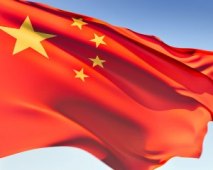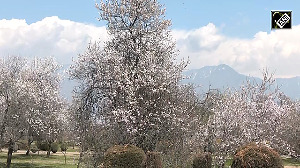 Creation of a post for promotion of bilateral economic relationship reflects the growing India-China trade.
Creation of a post for promotion of bilateral economic relationship reflects the growing India-China trade.
This week's permission by the Cabinet decision to create an economic wing in the Indian embassy in Beijing may seem like a mere footnote in the increasingly dynamic Sino-Indian relationship, but it actually symbolises the ceding of power by the Ministry of External Affairs to the ministries of finance and commerce.
For the first time in years and despite the fact that the recession isn't over yet, the department of economic affairs will fund a post of a 'minister, economic' in the Indian embassy in China, while the MEA will provide money for the post of a junior first secretary-level officer in the same division.
The creation of a post dedicated to the promotion of the bilateral economic relationship is a reflection of the growing trade between India and China, pegged at $43 billion (down from $51 billion the year before, according to MEA figures), second only to India's largest trading partner, the US.
However, government officials pointed out to a series of growing problems in the economic relationship, ranging from the Chinese imposition of a series of tariff and non-tariff barriers against Indian goods -- from mangoes and rice to pharmaceuticals and IT-related goods -- to the Indian reluctance to allow Chinese companies like Huawei into core sectors such as telecom.
The officials pointed out that China's refusal to allow market access to Indian goods was a significant factor in the continuing adverse trade balance, but emphasised that Delhi was hoping this would be "resolved, sooner than later" in the interest of both countries.
So, when Commerce Minister Anand Sharma, a former minister of state for external affairs, visited Beijing in January to participate in the eighth meeting of the Joint Economic Group, he saw the scope for expanding the relationship and upon his return, demanded the bifurcation of the economic and commercial wing in the Indian embassy, funded by the MEA.
At least on this front, the commerce minister had stolen the thunder from External Affairs Minister S M Krishna, whose April visit to Beijing didn't reveal too much publicly, save for the setting up of a hotline between the two establishments.
Both sides talked about the border dispute (where Krishna is believed to have assured his counterpart Yang Jiechi that India would do its part in keeping the peace for several decades to come), and while he also strongly took up the huge imbalance in trade, the new, finance ministry-led post is an indication that the Prime Minister's Office wants to balance eco-strategic issues with political-diplomatic matters.
This subtle shift-in-the-making is a reflection of the internal debate within the government on how to deal with China's rising power.
While the traditional security establishment tends to focus on border violations, Beijing's 'all-weather relationship' with Pakistan, which includes support for its nuclear and missile programmes, and its continued treatment of Arunachal Pradesh as disputed territory, the PMO is articulating a new line which aims to end the perception of China as India's 'major enemy' to a much more complex picture with several shades of grey.
In this new school of thought, economics is likely to play a much stronger role, with deputy chairman of the Planning Commission Montek Singh Ahluwalia much more closely involved with the character of Chinese investment in the power, telecom and infrastructure sectors in India.
Perhaps the shift is a manifestation of the pragmatism of the Mandarin-speaking former diplomat and current National Security Advisor Shivshanker Menon, whose views are clearly closer to Prime Minister Manmohan Singh than those of the previous NSA, M K Narayanan.
In fact, the security concerns around Huawei telecom and its purported linkages with the Chinese People's Liberation Army were first articulated by Narayanan in 2005.
Foreign secretary Nirupama Rao also elaborated upon this new school of thought on the eve of President Pratibha Patil's ongoing visit to China in a media briefing.
"I honestly feel that we must take a wider view of the relationship between India and China, a relationship between two large neighbours, a relationship between two of the largest developing countries, a relationship between two emerging global powers," said Rao.







 © 2025
© 2025